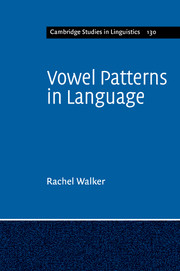Book contents
2 - Preliminaries: functional grounding
Published online by Cambridge University Press: 26 April 2011
Summary
Introduction
This chapter provides background on possible phonetic and psycholinguistic bases for positional licensing effects and vowel markedness. As introduced in chapter 1, this discussion ties into a hypothesis that positions or contexts that show the capacity to asymmetrically license distinctive phonological properties are liable to be ones that facilitate perception or production. Thus, restrictions on marked or perceptually difficult properties in vowels and other phonological elements are predicted to be more likely in positions where they suffer some functionally based disadvantage, and positions that show a capacity for licensing are predicted to present some advantage.
Quite generally, this discourse builds upon research in which certain phonological constraints are proposed to have a basis in what Kingston and Diehl (1994) call ‘phonetic knowledge,’ that is, “the speakers' partial understanding of the physical conditions under which speech is produced and perceived” (Hayes and Steriade 2004: 1). Interpreting the basis for phonological constraints' functional underpinnings more broadly with respect to the human speech processing system renders also relevant levels such as speech planning and lexical access in production and perception. Related research that explores versions of phonology that are phonetically and/or psycholinguistically based includes work by Archangeli and Pulleyblank (1994), Steriade (1995a, 1999a,b, 2001, 2009), Boersma (1998), Hayes (1999), and Smith (2005), among many others.
Information
- Type
- Chapter
- Information
- Vowel Patterns in Language , pp. 12 - 35Publisher: Cambridge University PressPrint publication year: 2011
